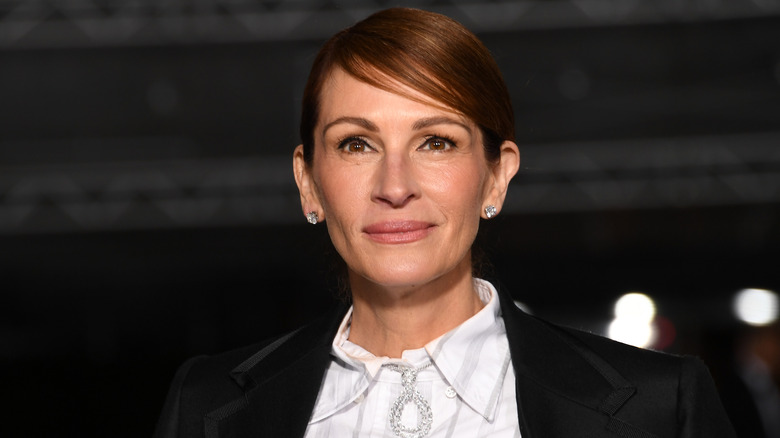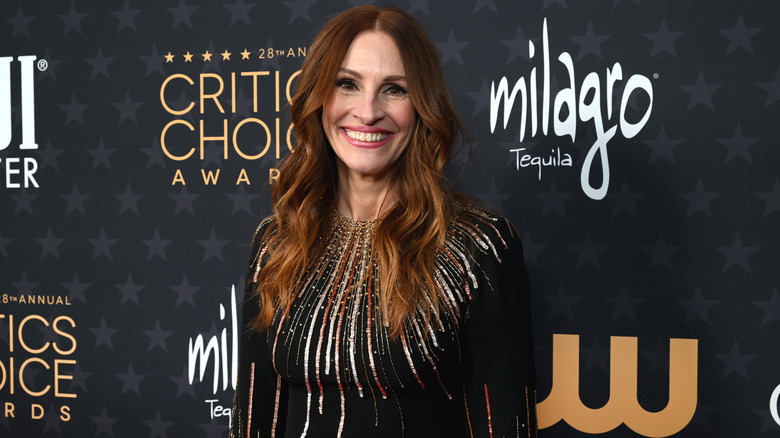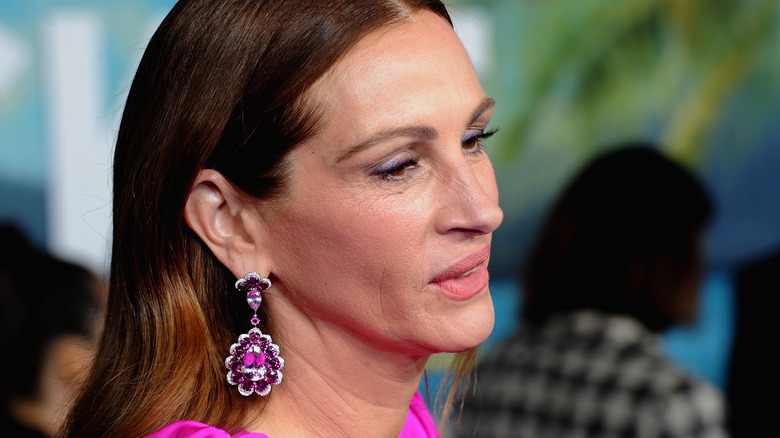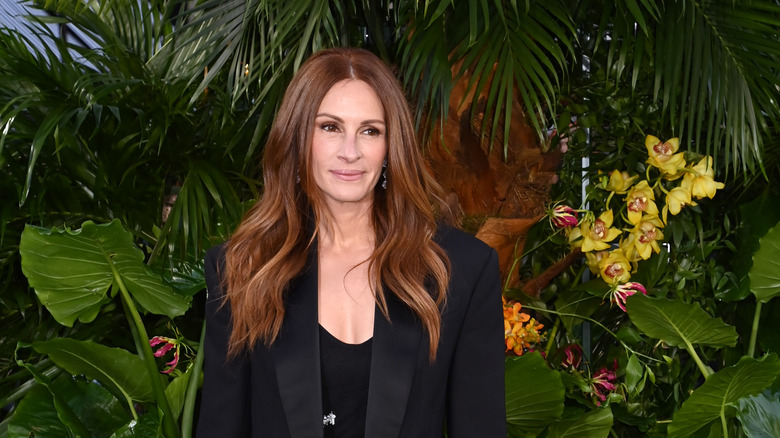Julia Roberts Cost Universal Pictures Serious Dough After Shakespeare In Love Debacle
"Shakespeare in Love" seems like a pretty innocuous movie at face value, but the truth is that it's been plagued by controversy basically since it was first released in 1998. Led by Gwyneth Paltrow and Joseph Fiennes, the film imagines a young, hot William Shakespeare (Fiennes) who, upon being scorned by his lover, falls for noblewoman Viola de Lesseps (Paltrow), who's engaged to the blatantly awful Lord Wessex (Colin Firth). Viola and Will first meet when she dons men's clothing and auditions for his newest play — with the blockbuster working title of "Romeo and Ethel the Pirate's Daughter" — and when he discovers she's a woman, he doesn't report her to the authorities for breaking the law by performing onstage. Instead, he just sleeps with her.
The movie, which uses a performance of what's ultimately called "Romeo and Juliet" as a background for the star-crossed "real life" love of Viola and Will, was pretty well received... until it made waves by beating "Saving Private Ryan" for Best Picture at the 1999 Oscars, a situation engineered by actual monster Harvey Weinstein. As it turns out, before "Shakespeare in Love" even started shooting, it was hit with a ton of problems thanks to the original Viola: America's sweetheart Julia Roberts.
Julia Roberts wanted a different actor to play Shakespeare
Fans of "Shakespeare in Love" may not know that, before Paltrow was attached to the project, Julia Roberts was set to star as Viola. If they don't know that, they definitely don't know the trouble she caused behind the scenes.
In an essay for Air Mail, "Shakespeare in Love" producer Ed Zwick revealed that Roberts was the film's original heroine, but ended up creating a total disaster in the process. Apparently, Universal Pictures was only sold on the project as a whole when Roberts' name entered the conversation, with Zwick recalling, "The mere possibility of having the 'Pretty Woman' wearing a corseted gown got the studio excited enough to cough up the dough." From there, "chemistry reads" between Roberts and potential Shakespeares began, as did the problems.
Roberts, for her part, was allegedly hellbent on Daniel Day-Lewis playing Shakespeare, to the point where she canceled said chemistry reads with other actors and arranged "for two dozen roses to be sent to Daniel Day-Lewis, along with a card that read: 'Be my Romeo.'" No matter how much Roberts begged, though, Day-Lewis was previously committed to "In the Name of the Father," and he just wasn't available.
Tons of actors auditioned for Shakespeare — and Roberts didn't like any of them
With Day-Lewis out of the running, Zwick says the production auditioned a ton of actors, including Ralph Fiennes, Hugh Grant, Rupert Graves, Colin Firth (who did end up in the film as the antagonist), Sean Bean, and Jeremy Northam. "Julia found fault with all of them: one was stiff, another wasn't romantic, and so on," Zwick said.
Unfortunately, the real problem became pretty obvious when Paul McCann showed up to read with Roberts. The actress was in full costume and, according to Zwick, she definitely looked the part. "But once she began to say the words, something was wrong," the producer revealed. "There was no magic. The problem wasn't the script. Or Paul McGann. It was Julia. From the moment she began to speak it was clear she hadn't been working on the accent."
Zwick tried to offer some feedback to the then 24-year-old Roberts, but to say she didn't take it well would... apparently be an understatement. "Sensing Julia's discomfort, I tried to be encouraging, but she must have intuited my unease, and I made the tragic mistake of underestimating her insecurity," Zwick said. When he tried to talk to her again the next morning, he was told that she'd checked out of her hotel entirely.
Julia Roberts cost Shakespeare in Love millions of dollars
By leaving the production behind and flying back to the U.S., Roberts ultimately cost Universal and the film itself a whopping $6 million. Despite Zwick telling the studio he would do everything he could to get Roberts back, whatever efforts he made didn't work, and the rest is history. Gwyneth Paltrow joined the project — which wasn't canceled only because costumes and sets had already been crafted thanks to Roberts' involvement — and won an Academy Award for her role, and the movie was catapulted into Oscar history when it won Best Picture. (Zwick also, apparently, almost got fired by Harvey Weinstein in the process, but managed to stick around.)
So how does Zwick feel about Roberts now? In the essay, he was surprisingly magnanimous. "I've never spoken to Julia again," Zwick said. "Instead, I've observed from afar as her work grew in depth and stature. I bear her no ill will. She was a frightened 24-year-old. I wasn't much older, trying to act the grown-up as I watched the Globe Theatre torn down. And with it my dreams of grandeur." It would stand to reason if Zwick was still pretty mad at Roberts for throwing a multi-million dollar tantrum, so it's nice of him to give her grace, but the fact remains that this was clearly an enormous and expensive mess.



